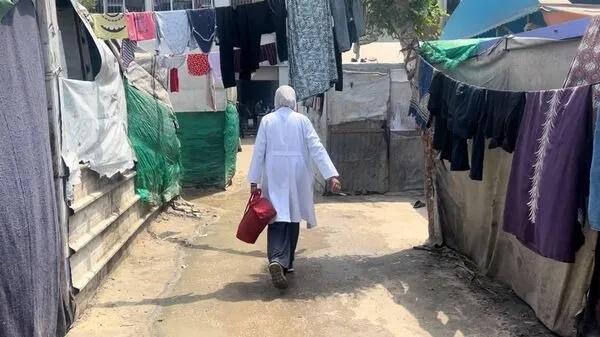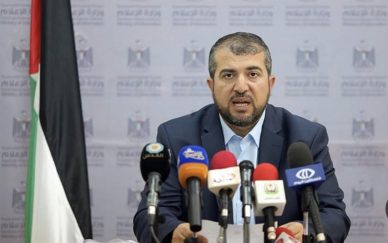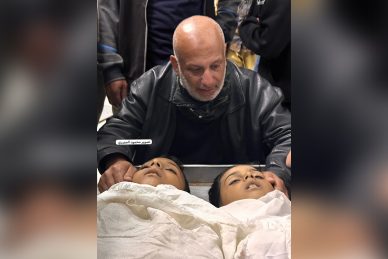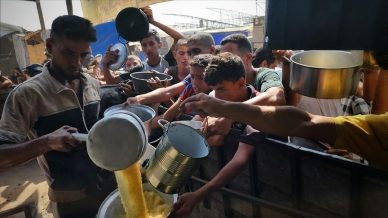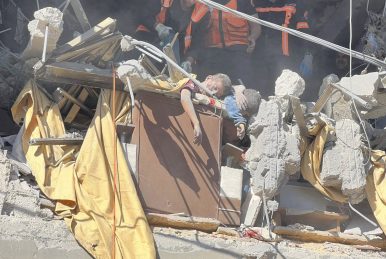GAZA, (PIC)
Nurse Riham Awad roams daily among the tents of displaced persons in the Mawasi area of Khan Yunis, in southern Gaza, to provide healthcare for war victims and people with chronic illnesses who cannot reach hospitals due to the collapse of the healthcare system.
Riham’s story in volunteer work for the displaced began with her mother, who suffers from diabetes and is afflicted with diabetic foot syndrome. Her mother faced wounds during the repeated displacements from one area to another due to the continuous extermination war on Gaza for the second consecutive year.
Palestinian nurse Awad states that diabetic foot wounds are serious as they can become infected due to poor blood circulation and decreased skin immunity. This infection can spread to surrounding tissues or reach the bones. She notes that high blood sugar levels weaken the healing process and reduce the effectiveness of white blood cells in fighting infections, potentially leading to chronic ulcers that turn into gangrene, which is difficult to treat and may require amputation if not properly cared for.
She adds, “I have been and still am providing nursing care for my mother, including treatment and dressing changes, and her question about the conditions of other patients like children, women, and the elderly sparked my curiosity about how I could help this vulnerable group.”
She explains that dozens of patients and injured individuals cannot reach hospitals due to the catastrophic conditions affecting the healthcare system and the small primary care centers located on the outskirts of cities, which have become difficult to access because of the Israeli ground invasion. Additionally, the roads are congested, and traveling from one place to another is risky due to ongoing intense Israeli bombardment. “Therefore, I chose to initiate providing care to those I can, using the information and experience I have.”
In the morning, Riham carries her bag on her back after checking her first-aid supplies, including sanitizers, gauze, ointments, and saline solution, and she visits several tents that await her day after day to check on their wounds and change dressings. She indicates that some wounds are infected and require a specialist to prescribe the appropriate antibiotics.
She clarifies that the cases she follows include various injuries, such as diabetic foot patients, amputees, and children with burns of different degrees. She highlights that the equipment and resources she uses for care are not always readily available. “I obtain them from some medical points in the displacement camps, which also help with what they have.”
She says that the work she does brings her happiness and satisfaction. “I find myself as I move between the tents of the displaced, providing assistance and healthcare to the injured and sick.”
Community solidarity
The healthcare system in besieged Gaza is experiencing significant collapse, with most hospitals out of service due to the ongoing Israeli attacks for the past 14 months. Many hospitals and health centers in Gaza have been targeted and rendered inoperative.
Warnings from humanitarian organizations and international institutions about the risk of a healthcare system collapse in Gaza have not ceased since the start of the extermination war on October 7, 2023, reaching a point where the system is unable to perform even the simplest tasks related to saving lives.
Meanwhile, the occupation has fabricated justifications for its war on hospitals, health centers, medical personnel, and even patients and their companions residing in healthcare facilities in Gaza. Ahmed Abu Al-Ata, a resident of the Deir al-Balah camp in the center of the Gaza Strip, has not hesitated to provide necessary medical services in his area.
He mentions that the idea of utilizing his medical skills arose from the systematic destruction of the healthcare system and the difficulty of accessing hospitals, either due to overcrowding with the injured or other factors such as the lack of transportation, especially in the evenings.
Abu Al-Ata contributes with whatever equipment and expertise he has and receives patients and the injured in his home within the camp. He points out that the lack of resources and medical supplies is the main obstacle in his work, focusing on providing pain relief, changing wound dressings, administering injections, and other nursing services related to his field.
He says, “What I and others with medical expertise do is simple work, but it helps bolster the humanitarian situation among the population and the displaced. Solidarity and cooperation are essential to strengthen the internal front amid the continuous aggression of the occupation, its destruction of hospitals, its assassination of many medical teams, and its targeting of civil defense and ambulance crews.”
Collapse of the healthcare system
According to health data, the Palestinian healthcare sector in Gaza has collapsed, and what remains serves at most 15% of the injured and afflicted by the aggression. It is unable to cater to those suffering from chronic illnesses and is incapable of treating epidemic diseases caused by overcrowding in shelters and the destruction of the sewage system.
According to Doctors Without Borders, about 350,000 people in Gaza suffer from chronic diseases such as high blood pressure, diabetes, asthma, and epilepsy, in addition to cancer and kidney patients.
The vast majority of these patients cannot find their essential medications or receive the necessary medical care, exacerbating their health conditions and adding new burdens to the already strained healthcare system due to the prolonged siege of Gaza.
The displacement of citizens from one place to another, lack of sufficient food and water, and the deterioration of environmental conditions due to aggression and destruction are all factors that will complicate the already disastrous humanitarian situation, negatively affecting new segments of the population.
The United Nations had previously sounded the alarm on December 13 regarding the worsening conditions in Gaza after the collapse of the healthcare system there.
The UN Office for the Coordination of Humanitarian Affairs stated that the enclave faces a “public health disaster” following the collapse of the healthcare system and the outbreak of diseases amid Israeli attacks that targeted hospitals and caused the displacement of hundreds of thousands of people.
The organization spoke about the spread of infectious diseases in Gaza, where internal displacement has led to overcrowding in shelters and other temporary living facilities for about 85% of the population.
The World Health Organization announced a significant increase in cases of acute respiratory infections, diarrhea, head lice, skin diseases, and other rapidly spreading illnesses.
According to the organization, only 11 out of 36 hospitals in Gaza are operating partially, with one in the north and ten in the south.
World Health Organization statistics indicate that there are only five hospitals in the enclave “operating partially” in northern Gaza (the center of the Israeli ground invasion), with eight out of eleven hospitals functioning in the south, where the Israeli army has urged civilians to evacuate to. However, only one of the eight hospitals still has the capacity to treat critical cases or perform complex surgeries.

